JUNE 1- TODAY’S READING FROM THE OLD TESTAMENT- 2 SAMUEL 18:1-19:10
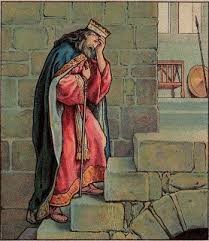 Absalom, you will recall, took the misleading counsel of Hushai rather than Ahithophel. Instead of striking David down immediately, Absalom fell for the suggestion that appealed to his pride. Hushai suggested he gather a larger army of men from all the tribes of Israel and stage a far more impressive defeat of David. This delay gave David the chance to muster a large, well-organized army of commanders of thousands and hundreds. He divided the entire army into thirds and put Joab, Abishai, and Ittai at the head of each division.
Absalom, you will recall, took the misleading counsel of Hushai rather than Ahithophel. Instead of striking David down immediately, Absalom fell for the suggestion that appealed to his pride. Hushai suggested he gather a larger army of men from all the tribes of Israel and stage a far more impressive defeat of David. This delay gave David the chance to muster a large, well-organized army of commanders of thousands and hundreds. He divided the entire army into thirds and put Joab, Abishai, and Ittai at the head of each division.
David, perhaps remembering how he was ensnared by sin with Bathsheba when he excused himself from battle, announces to his defenders that he intends to go out with his army. The people refuse David’s request, citing that if they were to flee, Absalom’s army wouldn’t care for them, nor would the enemy care if half their number were to be killed. Absalom’s rebellion was against David. They said David’ is worth ten thousand of us’ and it would be better strategically if David were to be ready to help them from the city. So, David stays by the Jerusalem city gate, as his new army goes out against his foes. David gives his three commanders this final charge, “Be gentle with the young man, Absalom, for my sake” (2 Samuel 18:5).
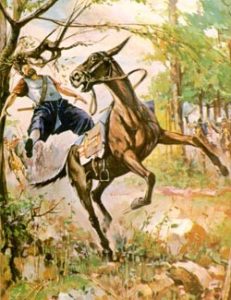 The battle takes place in the forest of Ephraim. The servants of David triumph over Absalom’s army. But the victory comes at a great cost. Twenty thousand men die. These were all men from throughout Israel, the people whom God appointed David to shepherd. And furthering the cost, Absalom, riding a mule, has his hair caught in the thicket of a tree and is left hanging helplessly by his hair ‘between heaven and earth’ as his mule escapes from beneath him. One of David’s servants reports this to Joab. Joab cannot believe that this man let the opportunity to kill Absalom pass. He tells him that he would have been richly rewarded. The man explains that even if he were given thousands of pieces of silver as if to say, ‘all the money in the world,’ he would not disobey the word of his king, David.
The battle takes place in the forest of Ephraim. The servants of David triumph over Absalom’s army. But the victory comes at a great cost. Twenty thousand men die. These were all men from throughout Israel, the people whom God appointed David to shepherd. And furthering the cost, Absalom, riding a mule, has his hair caught in the thicket of a tree and is left hanging helplessly by his hair ‘between heaven and earth’ as his mule escapes from beneath him. One of David’s servants reports this to Joab. Joab cannot believe that this man let the opportunity to kill Absalom pass. He tells him that he would have been richly rewarded. The man explains that even if he were given thousands of pieces of silver as if to say, ‘all the money in the world,’ he would not disobey the word of his king, David.
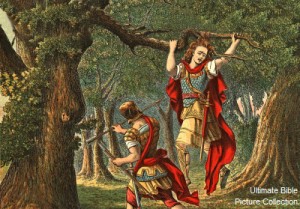 Joab will have nothing of this man’s excuses for sparing Absalom’s life. He returns to where Absalom is still caught in his vulnerable position hanging from the tree. He takes three spears and thrusts them into Absalom’s heart. The ten men who carry Joab’s armor finish the job, killing Absalom.
Joab will have nothing of this man’s excuses for sparing Absalom’s life. He returns to where Absalom is still caught in his vulnerable position hanging from the tree. He takes three spears and thrusts them into Absalom’s heart. The ten men who carry Joab’s armor finish the job, killing Absalom.
David’s cup of sorrow is filling to the brim. The domestic troubles that followed his sin with Bathsheba bring the haunting words of the prophet Nathan about his future to mind:
2 Samuel 12:9-10 9 ‘Why have you despised the word of the LORD by doing evil in His sight? You have struck down Uriah the Hittite with the sword, have taken his wife to be your wife, and have killed him with the sword of the sons of Ammon. 10 ‘Now therefore, the sword shall never depart from your house, because you have despised Me and have taken the wife of Uriah the Hittite to be your wife.‘
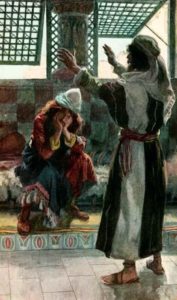 David had experienced the sorrow of an infant dying, a son raping a daughter, another son taking revenge and killing the brother, and now his son, Absalom, has stolen the hearts of the people, defiled his concubines, usurped his throne, and waged war against him. Yet David knew that he, the parent, was in no small way responsible. Absalom’s sins were his sins. Absalom’s weaknesses were his weaknesses. Absalom was a man of similar passion gone awry.
David had experienced the sorrow of an infant dying, a son raping a daughter, another son taking revenge and killing the brother, and now his son, Absalom, has stolen the hearts of the people, defiled his concubines, usurped his throne, and waged war against him. Yet David knew that he, the parent, was in no small way responsible. Absalom’s sins were his sins. Absalom’s weaknesses were his weaknesses. Absalom was a man of similar passion gone awry.
David is not a model parent. He indulges his children and neglects to deal with their misdeeds. In Absalom, the chickens have come home to roost. Yet David is blinded by sentimentality and is more upset about the death of his son, then the interests of the nation, his fighting men who risked their lives for him, or for the tens of thousands of those in the nation who died.
Joab showed no pity for Absalom. He was the enemy. He was a traitor and usurper. And David, Joab’s superior, had ordered the attack against him. Joab indeed disregarded David’s sentimental wish that Absalom be treated kindly. However, he could not be silent when David, blinded by natural affection, showed blatant disregard for the nation’s interests and the sacrifice of his warriors by mourning the death of his son in this way.
 Ahimaaz, the son of Zadok, was eager to bring the news to David that the LORD had sovereignly freed David from his enemies. Ahimaaz seems eager to share the good news of what God has done and bring glory to His Name. He has a good testimony, for David considers him a good man. But Joab sends the Cushite first to report what he has seen. Ahimaaz outruns the Cushite and glorifies God in giving the victory to David. David’s only reply is, “Is it well with the young man, Absalom?” Ahimaaz does not have the heart to tell David the truth. Perhaps he is like many an eager preacher who fears preaching the whole truth. Bad news needs to be told if we are to understand the good news.
Ahimaaz, the son of Zadok, was eager to bring the news to David that the LORD had sovereignly freed David from his enemies. Ahimaaz seems eager to share the good news of what God has done and bring glory to His Name. He has a good testimony, for David considers him a good man. But Joab sends the Cushite first to report what he has seen. Ahimaaz outruns the Cushite and glorifies God in giving the victory to David. David’s only reply is, “Is it well with the young man, Absalom?” Ahimaaz does not have the heart to tell David the truth. Perhaps he is like many an eager preacher who fears preaching the whole truth. Bad news needs to be told if we are to understand the good news.
The Cushite takes a shorter route but through more difficult terrain. This might have given him some time to reflect on how to deliver the news without causing the king to react by killing him as he had other messengers who delivered bad news (2 Samuel 1:4-16; 4:8-12). When the Cushite arrives, offering the same report of the Lord having delivered from the hand of all who has risen up against him, David asks the same question, “Is it well with the young man Absalom?” The Cushite replies tactfully, “Let the enemies of my lord the king and all who rise up against you for evil, be as that young man.”
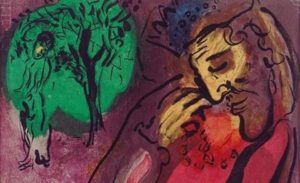 David goes up to the chamber above the city gate and mourns, crying out, “O Absalom, my son!” 5 times he repeats, “My son.” “Would I had died instead of you, O Absalom, my son, my son!”
David goes up to the chamber above the city gate and mourns, crying out, “O Absalom, my son!” 5 times he repeats, “My son.” “Would I had died instead of you, O Absalom, my son, my son!”
Although the idea of ‘the greater David’ substituting himself for the guilty is foreshadowed here, the plain fact is that David recognizes once again his own personal guilt in this tragic outcome.
Joab rightly rebukes David for letting his sentiments get in the way of his leadership.
 2 Samuel 19:5-7 5 Then Joab came into the house to the king and said, “Today you have covered with shame the faces of all your servants, who today have saved your life and the lives of your sons and daughters, the lives of your wives, and the lives of your concubines, 6 by loving those who hate you, and by hating those who love you. For you have shown today that princes and servants are nothing to you; for I know this day that if Absalom were alive and all of us were dead today, then you would be pleased. 7 “Now therefore arise, go out and speak kindly to your servants, for I swear by the LORD, if you do not go out, surely not a man will pass the night with you, and this will be worse for you than all the evil that has come upon you from your youth until now.”
2 Samuel 19:5-7 5 Then Joab came into the house to the king and said, “Today you have covered with shame the faces of all your servants, who today have saved your life and the lives of your sons and daughters, the lives of your wives, and the lives of your concubines, 6 by loving those who hate you, and by hating those who love you. For you have shown today that princes and servants are nothing to you; for I know this day that if Absalom were alive and all of us were dead today, then you would be pleased. 7 “Now therefore arise, go out and speak kindly to your servants, for I swear by the LORD, if you do not go out, surely not a man will pass the night with you, and this will be worse for you than all the evil that has come upon you from your youth until now.”
David heeds this counsel and takes his place sitting in the city gate. The people of Israel realize the significance of this turn of events, and even those who rebelled against David by following Absalom, now considered “bringing back the king”. (2 Samuel 19:10).
These words make us think of the true Anointed King, the Greater David, and the incessant prayer request He gave us, “Thy kingdom come, Thy will be done.”
Let us not be silent about bringing back the king!
TODAY’S READING FROM THE NEW TESTAMENT – JOHN 20:1-31
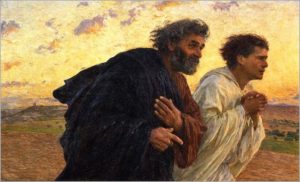 John 20 is the glorious account of the resurrection. Once again, we see that John’s account emphasizes the personal. We get an up-close picture. After all, John was the one who raced Peter to the tomb! He sees that the tomb is empty and believes!
John 20 is the glorious account of the resurrection. Once again, we see that John’s account emphasizes the personal. We get an up-close picture. After all, John was the one who raced Peter to the tomb! He sees that the tomb is empty and believes!
John starts his account before dawn when the six women come to the tomb to do what they would have done on the day of his burial had they not been prohibited by the special Sabbath at Passover and the traditional Sabbath. It was now the first day of the week.
John focuses on Mary Magdalene, although the other accounts show that she was with five other women, three of whom were also named Mary.
The first additional Mary was the mother of James the younger and Joseph. The second was Mary, the mother of Jesus, who had four other sons and at least two daughters (Mark 6:3). The third Mary was the wife of Clopas. Eusebius writes that Clopas was the brother of Joseph of Nazareth, making this Mary Jesus’ aunt. There were four Marys in all. We also know that Salome, the wife of Zebedee and the mother of James and John, was present, and Joanna, the wife of Chuza, the household manager of Herod Antipas (Luke 8:3).
John emphasizes how the witnesses of the resurrection ‘see’ and ‘believe’.
When Mary sees that the grave is empty, she at first believes that the body was taken to perhaps another burial place. She has not yet comprehended the significance of the placement of the graveclothes that indicated that the body had passed right through them.
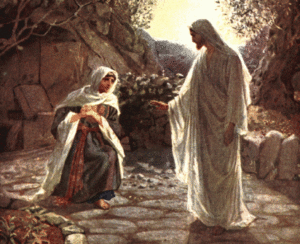 But Jesus is there calling her by name. She perceives him to be the gardener. John seems to highlight the restoration of the human race to the Edenic fellowship when God walked in the garden in the cool of the day (Genesis 3:8). Later in the chapter, as God breathed on the first man, Adam, making him a living soul (Genesis 2:7), Jesus would breathe on the disciples (John 20:22), indicating that now, as head of the new creation, He was the life-giving Spirit (1 Corinthians 15:45).
But Jesus is there calling her by name. She perceives him to be the gardener. John seems to highlight the restoration of the human race to the Edenic fellowship when God walked in the garden in the cool of the day (Genesis 3:8). Later in the chapter, as God breathed on the first man, Adam, making him a living soul (Genesis 2:7), Jesus would breathe on the disciples (John 20:22), indicating that now, as head of the new creation, He was the life-giving Spirit (1 Corinthians 15:45).
Mary recognizes Jesus’ voice and turns to Him (John 20:14). This reminds us of John’s experience on the island of Patmos when John recognizes the voice and turns to see Jesus (Rev 1:12). Mary exclaims, “Rabboni!” (Great Teacher). She, like the other women, clings to Jesus (Matthew 28:9). Jesus says, “Stop clinging to me.” They want Him back in their life as He was, the Great Teacher. But He had a greater role. He was to go to the Father where He would be given a Name that is above every Name, the credential and crowning as the Author of our salvation, Christ the King, the Priest, the Prophet, the Judge of the living and the dead.
As the Author of the reconciling work of redemption, He must ascend to His Father, who is now our Father, His God who is now our God.
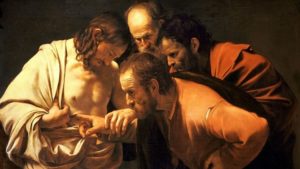 When the disciples see Jesus, He is in His resurrection body that knows no bounds. You cannot lock out His presence, even by barring the doors to Him. John emphasizes the transcendent quality of Christ in His resurrection. There is no record of His coming into a room or leaving. He makes Himself known in a very real and tangible way. He appears a week after the resurrection to Thomas, and knowing his claim that he would not believe Jesus was risen unless he could put his hand in his side, He says,
When the disciples see Jesus, He is in His resurrection body that knows no bounds. You cannot lock out His presence, even by barring the doors to Him. John emphasizes the transcendent quality of Christ in His resurrection. There is no record of His coming into a room or leaving. He makes Himself known in a very real and tangible way. He appears a week after the resurrection to Thomas, and knowing his claim that he would not believe Jesus was risen unless he could put his hand in his side, He says,
John 20:27 27 “Reach here with your finger, and see My hands; and reach here your hand and put it into My side; and do not be unbelieving, but believing.”
Thomas answers, believing and confessing, “My Lord and my God!”
And this is the purpose of John’s gospel account:
John 20:31 31 but these have been written so that you may believe that Jesus is the Christ, the Son of God; and that believing you may have life in His name.
TODAY’S READING FROM THE BOOK OF PSALMS- PSALM 119:153-176
We come to the final 3 sections of Psalm 119 today, beginning with the letters ‘Resh’, ‘Shin’, and ‘Tav.’
The eight verses beginning with ‘Resh’ are part of a prayer for deliverance. He makes his appeal to God according to God’s self-revelation in His Word.
 “Revive me according to Your Word.”
“Revive me according to Your Word.”
In prayer, he contrasts his dependence upon God’s promises to the demeanor of his enemies, who ‘do not seek Your statutes’. He realizes that ‘salvation is far from them.’ The idea is that salvation comes to us through faith in the revelation of God’s Word.
Despite persecution and trials, his affection for God’s truth abides.
Psalm 119:162 162 I rejoice at Your word, as one who finds great spoil.
We can see that meditation upon God’s Word and praise for God’s testimonies are a part of the Psalmist’s daily life. Let this inspire us to do the same.
Do you have great peace? Do you get easily offended? What is your relationship like with God’s Word?
Psalm 119:165 165 Those who love Your law have great peace, And nothing causes them to stumble.
TODAY’S READING FROM THE BOOK OF PROVERBS- PROVERBS 16:14-15
Proverbs 16:14-15 14 The fury of a king is like messengers of death, but a wise man will appease it. 15 In the light of a king’s face is life, and his favor is like a cloud with the spring rain.
How much more we need to live in the light of the King of Kings and be grateful for the favor that He shines upon us who are in Christ Jesus.
PRAYER: Father, we want to praise You and run with the good news. We thank You for giving us the victory in Jesus’ triumph over sin and death on our behalf. Jesus has established us in peace, having reconciled us to You. And now we can say by the Spirit, “Abba Father!” We ask that we learn from Your precepts and testimonies. Do not allow natural sentiment to get in the way of our being devoted to the purpose for which You called us. We love You, and we want to show our love by feeding, caring for, and blessing Your flock! May the fragrance of the Risen Christ be upon our lives as we set Him apart as King! May your kingdom come, and Your will be done in our lives today. In Jesus’ Name. Amen.
